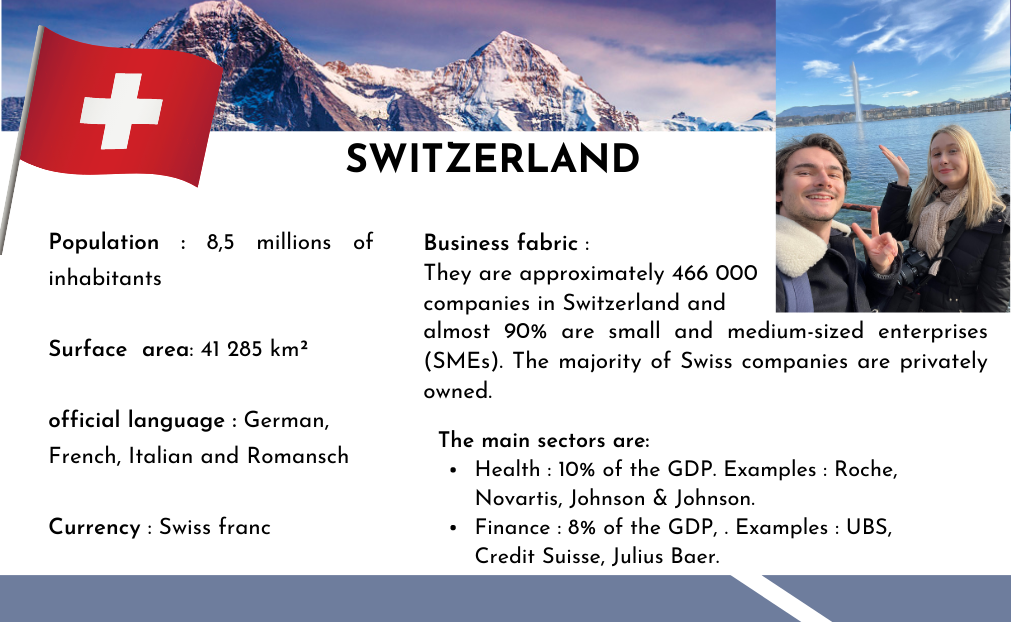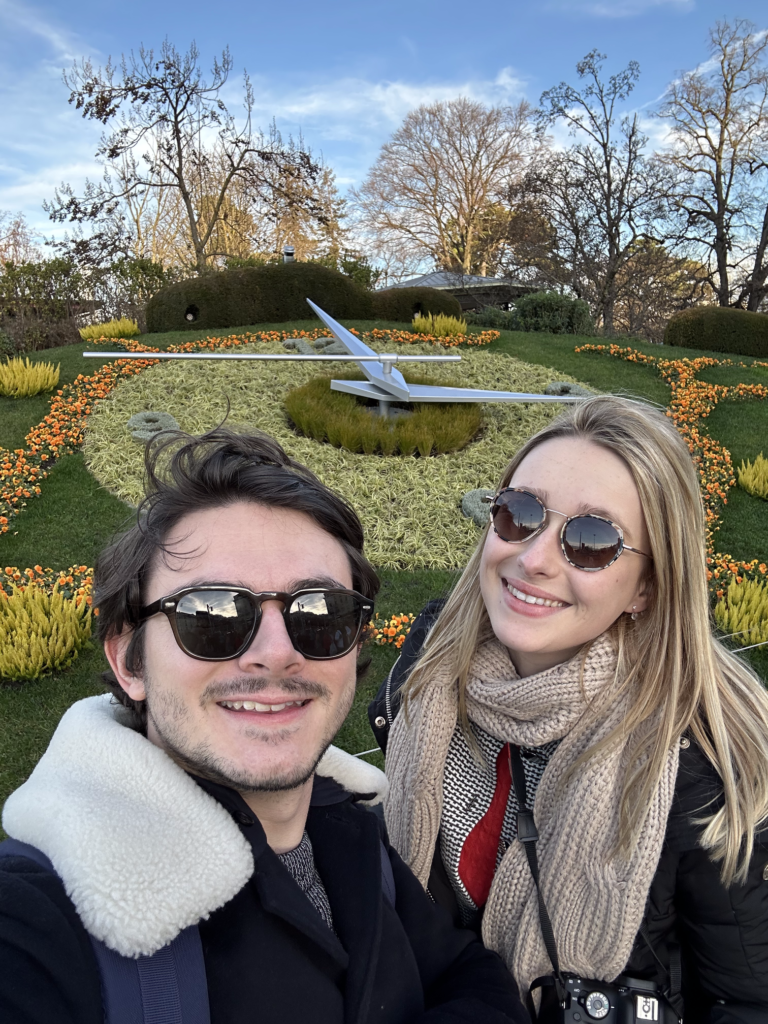
In this article, we will give you our impressions and analysis regarding the link between culture and management in Switzerland!
But before that, find our articles on our favorite companies located in Switzerland by clicking below:

Here we go! 🤗
By early 2022, we knew we wanted to embark on our Managerial Odyssey. In May, we applied. In September, we learned of the news that would change our lives!
The preparation phase turned out to be more intense than we expected! A reflection on the problems of our Odyssey: the search for partners, logistical preparation, training in the field of managerial innovation, making contacts in the destinations we visited…. but we benefited from the unfailing support of our super coach Thomas Bouchard (Manang Coaching) and professors from universities of emlyon and Paris-Dauphine.
Ready more than ever with a thirst for encounters and discoveries, we embarked on our Odyssey on January 6, 2023.
For about three weeks, we had the opportunity to discover Switzerland and its companies! Meeting 5 management specialists, 15 employees and visiting 5 companies as well as a graduate school (École Hôtelière de Lausanne) allowed us to better understand the impact of Swiss culture on managerial vision.
And we were quite surprised: The geographical proximity of Switzerland to France is not really reflected in the field of management and it is asserted by the Swiss…
In this article, we are going to reveal to you the key points that we have identified during our exchanges concerning Swiss managerial characteristics and why.
We had some great times in Switzerland, it is a human adventure that reinforces our convictions and makes us all the more eager to continue the adventure! 😊
When we first started our Odyssey, when we announced our departure to Switzerland, the reactions were often the same… “not very exotic”, “surely like in France”… but then, in the end, what makes Switzerland different?
THE FINDINGS:
We discovered that the Swiss had a very clear-cut perception of the French at work. “Archaism in social relations”, “a quasi-systematic antagonism between bosses and employees”, a ” grand director ” who can overrule any decision… Here are the first feedbacks we had in just a few words, and we are hardly exaggerating!
Actually, the Swiss are proud of their collaborative approach to work: relations in companies are generally less pyramid-like than in France.
As for social peace, they believe it is made possible by the improved collaboration between employees and management, and also thanks to the standard of living. Salaries are much higher than in France ($69,726 gross/year on average).
We will try to explain why social and hierarchical interactions work differently in Swiss companies, based on the exchanges we had.
SOURCES OF EXPLANATION:
1° L’influence du fonctionnement politique sur l’entreprise : un esprit participatif et de consensus
We asked several Swiss to explain how their political system works: Susanne Aebischer, a member of parliament for the state of Fribourg, was best placed to answer us! The Swiss political system is a system founded on direct democracy and consensus. This means that citizens can participate directly in political decision-making, most notably, through the use of referendums. Furthermore, the different political groups try to find common ground in order to make collective decisions.
So a culture of participation and consensus truly emerges. Susanne explains that “when citizens disagree, a citizens’ initiative is launched. It leads to a referendum, the result of which is final and holds the ultimate say.
This is also true at the mayoral level. There are several participatory processes that allow citizens to engage and influence local policies. (Local referendums, popular initiatives, public consultations…).
Switzerland is divided into cantons, which are administrative units similar to states. Each canton has a degree of autonomy to legislate and administer its own internal affairs, such as education, health and finance.
It should also be noted that the president in Switzerland changes every year and has a purely representative role. Therefore, for the Swiss, the cult of the leader is not natural and often seems absurd and illogical.
We really felt this mentality of decentralized decision-making and active participation within the companies we had the good fortune to meet. Here are some examples:
-At Creaholic, a consulting and engineering company responsible for finding technical solutions for its clients, there is a radical embodiment of this mentality: everyone has the same position: “professional inventor.” This gave the feeling that everyone was equally important there, that each consultant, engineer or designer was like a piece of a puzzle, necessary for the smooth running of the company. Moreover, the consultants are all free to choose the mission to which they will commit, as long as it falls within the main principles of the organization (e.g. no projects related to the military sector).
-The same mentality can be found at the Alternative Bank of Switzerland. Nicole Bardet explains that the cult of the leader is something that has no place there. Inspired by sociocracy 3.0, the Alternative Bank of Switzerland has decided to adopt a more agile style of management. Decisions are made in a collaborative and fair fashion by all members of the organization. It relies on the use of circles, which are groups of people gathered to manage a specific area of the organization.
The members of each circle have defined roles and responsibilities, furthermore they are responsible for managing the relationships between the different circles.
Each of these circles is “led” by a facilitator, who is responsible for guiding the circle members in their decision-making process.
2° The influence of education which makes one more autonomous and encourages teamwork
Undoubtedly, corporate mentality is influenced by education. A Swiss friend from the city of Sion tells us about how Switzerland differs from France in terms of school: “we work a lot more in groups, we are asked to find solutions to problems, without any preconceived answers or lessons”, and this is from a very young age. She finds that in France, there is too much of a tendency to make us “spit out” a lesson, we are taught how to reproduce, whereas in Switzerland, the student’s creativity is encouraged. We also encourage a lot of group work, which is often done in higher education in France, but less so in elementary school.
Following some research, it was discovered that through certain methods, the Swiss educational system does indeed encourage responsibility and reflection in students:
Project-based learning:
For example, at the Wiedikon elementary school in Zurich, students conducted an awareness campaign on the importance of water efficiency. The students worked together to find practical solutions to reduce water consumption in the school and the neighborhood.
Letting students choose the topics they study:
For example, at l’Ecole secondaire de La Rôtisserie in Geneva, students are encouraged to explore topics that interest them outside of class time. Teachers then act as mentors to help students find the resources they need.
Civic education:
For example, at the Ecole primaire de la Plaine in Lausanne, students participate in volunteer activities in their neighborhood to understand their role in society and become active and responsible citizens.
All this was confirmed during our visit to the Ecole Hôtelière de Lausanne. Grégoire Pavillon showed us around the premises and when he showed us the collective rooms of the EHL boarding school (2 people), he explained to us that according to them learning is a social process. Students must work together in order to succeed in their studies, but also in their professional life. Indeed, the prestigious school puts a point of honor on learning through experience. For example, they are asked to carry out “student-company” projects. Students are assigned to companies and must carry out specific missions in groups. For example, the missions can be “to imagine a new concept for a seasonal hotel restaurant”, “to invent a new range of fresh products”, “to help a hotel company improve its relationship with customers to boost sales and engagement”….
In addition, teamwork is extended beyond the classroom at EHL: it is further present in student committees. Different committees exist for different interests. Students can choose topics that are of particular interest to them. For example, there is the Corporate Responsibility Committee, the We Wine Club, the Entrepreneurship Club ….
It’s no wonder that with such an education system, employees have a real appetite for collaborative work and also highly autonomous..
3° The influence of Protestantism: no pretentiousness and less hierarchy
Switzerland, unlike France, has a predominantly Protestant culture. Philippe-Raymond Laurent, a Frenchman who has worked all his life in Switzerland in positions of high responsibility as well as a teacher and dean at a university, confides to us that in Swiss business: “everyone is on the same level and there is not one head that sticks out! By this he means that wanting to appear superior to others is frowned upon in Switzerland. He explains that this is an implicit Swiss rule stemming from Protestantism, a religion in which pretentiousness is terribly perceived.
Indeed, in Protestantism, pretentiousness is considered an arrogant and selfish attitude that runs contrary to the teachings of humility and modesty. Biblical words such as “For every one who exalts himself will be humbled, and he who humbles himself will be exalted.”.” (Luke 14:11) or “Pride comes before the fall” (Proverbs 16:18).
For more information, Philippe recommends the book The Protestant Work Ethic and the Spirit of Capitalism by Max Weber.
4° Historical legacy: a more natural trust for the Swiss?
According to Susanne Aebischer (Member of Parliament for the State of Freiburg), explanations can be found within cultural heritage. “In France, you had to revolt and kill the King! This surprised us a bit at first! But according to her, France’s history explains in part why we have a stronger social climate of mistrust in France.
And this mistrust towards humans causes a vicious circle, a self-fulfilling prophecy. This is what Mc Gregor explains in his “X and Y” theory of motivation. This theory describes two different perspectives on how managers can view their employees. Theory X views employees as naturally lazy and unmotivated people who need to be supervised and controlled, while Theory Y views employees as motivated and capable of autonomy, who respond well to accountability and trust.
→ In Switzerland, there is more of a Y view of employees, therefore more trust.
For example, at Mantu in Geneva, trust is part of the company’s DNA. There is a genuine trust given to young people. For example, the opening of the China office was orchestrated by a 23-year-old girl, as was the opening of the Canada office and a 24-year-old man for the Chile office.
Here, briefly, are the other points that marked us in Switzerland:
We felt Swiss multiculturalism during these 3 weeks. This can be explained by the linguistic differences present, but also by the autonomy of each canton.
We were able to observe some rivalries between certain cantons, and even certain cities. For example, the RHNe (Réseau Hospitalier Neuchâtelois) told us that they feel strong a strong rivalry between their site in the city (in Neuchâtel) and their more outlying site in the countryside (in La Chaux-de-fond). In La Chaux-de-fond, Neuchâtel’s inhabitants are seen as “bourgeois”, and on the other hand, Neuchâtel’s inhabitants see them as “peasants”! But why? The laws that govern the functioning of the hospital network are made in a decentralized way, by the canton of Neuchâtel and not by the Swiss State. And there is an amalgam between the authorities in Neuchâtel and the management of the Neuchâtel site, who are sometimes perceived as accomplices of restrictive legislation.
Moreover, Micheline, an inhabitant of the canton of Valais that we met, taught us that the inhabitants of the French-speaking canton of Valais do not hesitate to label the neighboring German-speaking canton as “lazy”!
Thus, sometimes we feel certain cleavages between the different cantons.
To another extent, if the Swiss have a great openness to the world (40% of Geneva’s population is foreign), it is important to underline that this also complicates relations in companies, especially when there are different languages spoken in the different sites of a company (often, between French and German).
→ However, these are minor problems, and we believe that multilingualism and multiculturalism remain central assets of Switzerland.
In Switzerland, as in many other countries of the world, climate awareness is growing. Every year, new regulations in favor of the climate are issued (the CO2 Law, Swiss Soil Strategy, development of a long-term climate strategy…).
“Switzerland is a model in terms of climate protection: its rail network is the most environmentally friendly in the world. The Swiss hold the record for the number of kilometers traveled by train per inhabitant: 2400 km per year. The freight is transported ¾ by rail and 90% of the network’s energy needs are supplied by hydroelectricity.
In addition, we can also talk about Zurich which is exemplary in terms of ecology. It was elected “most sustainable city in the world” in 2016. The 2000-watt society project aims to reduce the electricity consumption of Zurich’s inhabitants in half by 2050. Currently the average consumption per capita is 6300 watts compared to 4200 in Zurich.
This climate awareness was really felt in the companies we met:
-At Creaholic in Biel, impactful intrapreneurship is encouraged by the “100h practice”. Each employee can devote up to 100 working hours per year to a personal project, whatever it may be. And very often, eco-responsible projects are chosen! If, after 100 hours, the idea has proven its feasibility and there is initial evidence of market demand, the company invests in the project and the initiator of the idea becomes the head of a new company. This is how 12 spin-off companies came into being thanks to Creaholic. The company acts as an incubator/investor for its employees. In practice, employees have very often chosen to develop an eco-responsible product, which shows the Swiss’ appetite for progress. (e.g the Jioulia shower).
-The Alternative Bank of Switzerland in Lausanne invests in projects that are respectctful of nature, human beings and animals.
The Geneva-based Mantu Group has been awarded a gold medal by EcoVadis, and received the first ESG syndicated loan in Europe.
However, the consumption of resources per capita is higher than the European average. According to Eurostat, in Switzerland, the material footprint is 17.1 tons compared to the European average of 14.5 tons (the material footprint represents the the attribution of global material extraction to domestic final demand of a country).
Another problem is that all the emissions generated abroad for the manufacturing of imported goods (raw materials…) are taken into account, Switzerland ranks among the highest per capita emitters in the world…
A snapshot of our Swiss adventures:

We hope you enjoyed this article! Thanks and see you soon!
Élodie & Dimitri
| Cookie | Duration | Description |
|---|---|---|
| cookielawinfo-checkbox-analytics | 11 months | This cookie is set by GDPR Cookie Consent plugin. The cookie is used to store the user consent for the cookies in the category "Analytics". |
| cookielawinfo-checkbox-functional | 11 months | The cookie is set by GDPR cookie consent to record the user consent for the cookies in the category "Functional". |
| cookielawinfo-checkbox-necessary | 11 months | This cookie is set by GDPR Cookie Consent plugin. The cookies is used to store the user consent for the cookies in the category "Necessary". |
| cookielawinfo-checkbox-others | 11 months | This cookie is set by GDPR Cookie Consent plugin. The cookie is used to store the user consent for the cookies in the category "Other. |
| cookielawinfo-checkbox-performance | 11 months | This cookie is set by GDPR Cookie Consent plugin. The cookie is used to store the user consent for the cookies in the category "Performance". |
| viewed_cookie_policy | 11 months | The cookie is set by the GDPR Cookie Consent plugin and is used to store whether or not user has consented to the use of cookies. It does not store any personal data. |